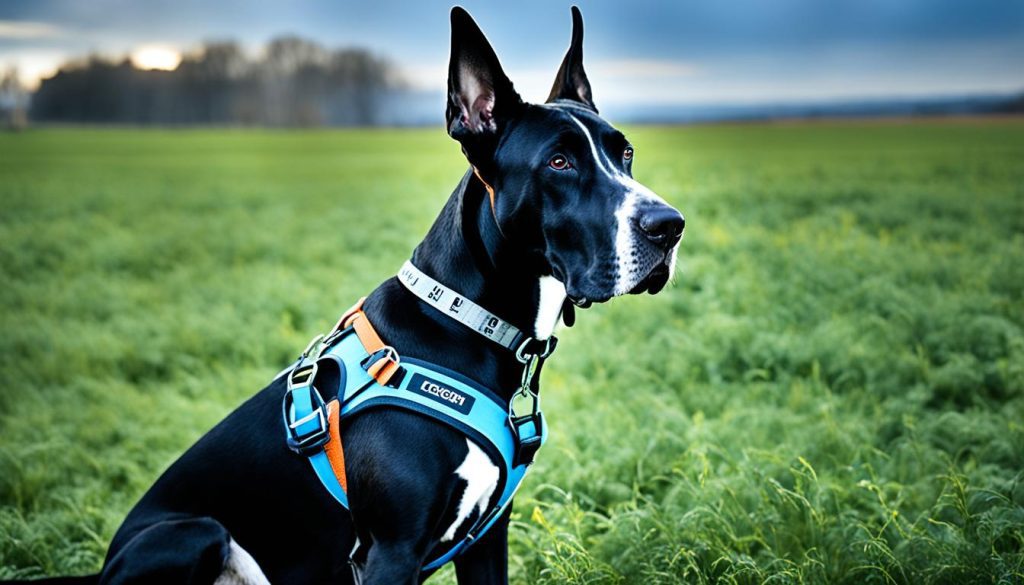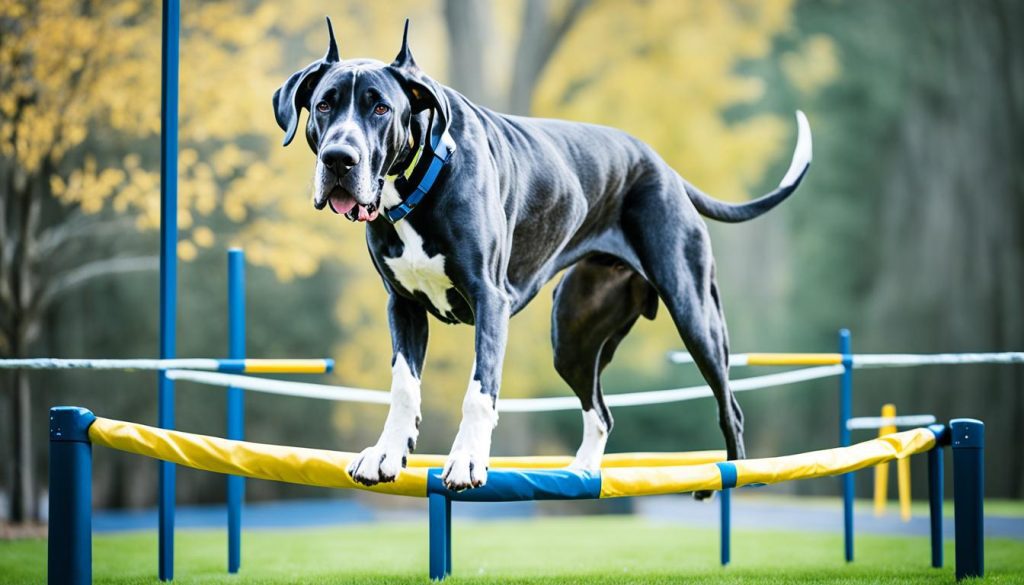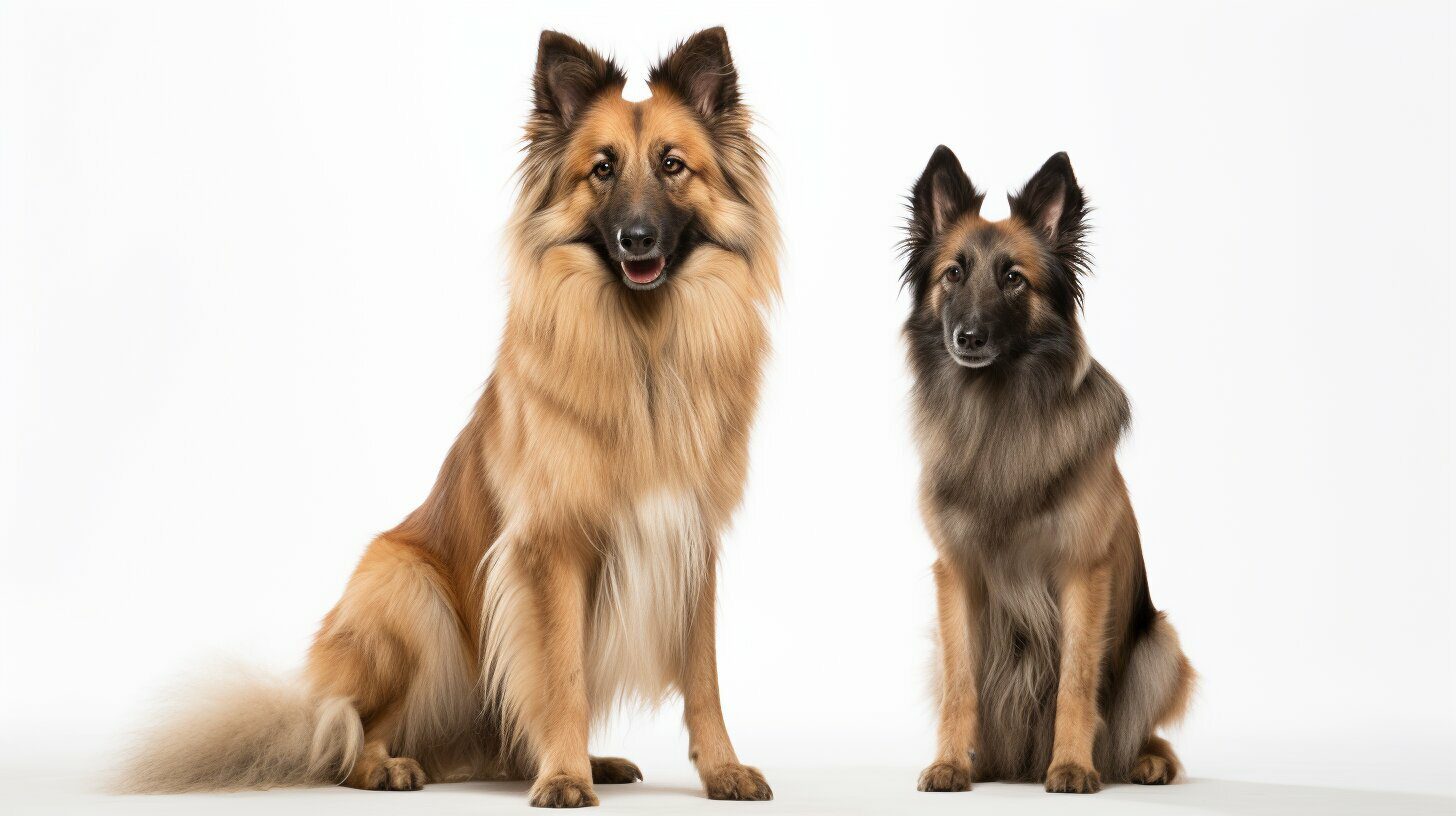Are Great Danes smart? Do they possess the intelligence that matches their impressive size and gentle demeanor? In this article, I will explore the intelligence of Great Danes and shed light on their cleverness and problem-solving abilities.
Are Great Danes Smart
- Great Danes are known for their loyalty, sociability, and good nature.
- They are relatively low-energy indoors, making them suitable for apartment living.
- Great Danes are easy to train and can exhibit clever problem-solving abilities.
- They have a history as working dogs and are considered one of the smartest dog breeds.
- Proper training, socialization, and care are crucial to nurture their intelligence.
The Characteristics of Great Danes
Great Danes are an impressive breed known for their sleek and elegant appearance. With a variety of coat colors and their characteristic floppy ears, they have a distinct charm. However, it is their large size that truly sets them apart. Male Great Danes can reach up to 32 inches in height and weigh between 100 and 120 pounds, while females are slightly smaller in size. Despite their imposing stature, Great Danes have an average energy level and are not overly active.
This breed requires regular exercise to maintain their health, but they are generally more inclined towards lounging around the house and relaxing with their human companions. They are not known for their intensity or hyperactivity, making them suitable for individuals or families who prefer a calmer canine companion.
Great Danes are considered easy to train and can exhibit clever problem-solving abilities. Their intelligence and willingness to learn make them highly trainable, and they can quickly grasp new commands and tasks. This breed’s cleverness can be seen in their ability to problem-solve and find creative solutions to obstacles or challenges they may encounter.
Size Comparison of Great Danes
| Gender | Height | Weight |
|---|---|---|
| Male | Up to 32 inches | 100-120 pounds |
| Female | Slightly smaller | – |
Traits of Great Danes
| Trait | Description |
|---|---|
| Energy Level | Average |
| Trainability | Easy to train |
| Problem-Solving Abilities | Clever |
Great Danes as Working Dogs
While Great Danes are often seen as family pets, they have a history as working dogs. Originally bred for hunting boars and protecting estates, Great Danes were valued for their strength and ability to bring down large prey. Over time, their roles shifted, and they became more commonly kept as companion animals due to their gentle disposition. Their intelligence and problem-solving abilities were important in their working roles, and these traits are still present in the breed today. Great Danes are known to be one of the smartest dog breeds.
Great Danes have a strong work ethic and excel in various tasks that require intelligence and problem-solving skills. They have been used in search and rescue operations, as therapy dogs, and in police work. Their large size and imposing presence can be an advantage in certain working roles, as they can intimidate potential threats and provide a sense of security.
One example of Great Danes’ intelligence and adaptability as working dogs is their success in the field of therapy. Their gentle nature and intuitive understanding of human emotions make them excellent therapy dogs, providing comfort and support to individuals in need. Great Danes have a calming presence and can sense when someone is in distress, offering solace and companionship.
Great Danes as Therapy Dogs
Great Danes have proved to be exceptional therapy dogs, making a positive impact on the lives of many individuals. Their gentle nature, empathy, and intelligence allow them to connect with people of all ages, providing comfort and emotional support.
As therapy dogs, Great Danes visit hospitals, nursing homes, and schools to bring joy and companionship to patients, residents, and students. Their presence has shown to reduce stress and anxiety, promote healing, and enhance overall well-being.
Great Danes have unique qualities that make them well-suited for therapy work. Their size alone can be comforting to individuals in need, and they have a natural ability to sense when someone requires emotional support. Additionally, their calm demeanor, trained behavior, and friendly disposition make them safe and reliable in various therapy settings.
| Benefits of Great Danes as Therapy Dogs |
|---|
| Reduce stress and anxiety |
| Promote healing and recovery |
| Enhance emotional well-being |
| Provide companionship and comfort |
| Improve social interactions |
| Inspire confidence and motivation |

Great Danes continue to make significant contributions as working dogs in various fields, showcasing their intelligence and adaptability. Whether it’s protecting, assisting, or providing therapy, their remarkable qualities and problem-solving abilities shine through. Great Danes truly embody the perfect combination of strength, intelligence, and gentleness that make them exceptional working dogs.
Training and Socialization of Great Danes
Great Danes are known for their intelligence and can be trained effectively using positive reinforcement methods. To bring out the best in these intelligent creatures, early socialization and training are key. Providing clear boundaries and consistent training from a young age helps establish a foundation for their behavior and responsiveness.
While Great Danes have a reputation for being intelligent, they can also be stubborn learners at times. However, with patience and consistent training, they can become well-behaved and responsive companions. By using positive reinforcement techniques, such as rewards and praise, you can motivate your Great Dane to learn and overcome any stubbornness.
Effective Training Techniques
- Start training your Great Dane from a young age to establish good habits and behaviors.
- Use positive reinforcement methods, such as rewards and treats, to motivate and encourage your Great Dane during training sessions.
- Keep training sessions short and engaging to maintain their interest and focus.
- Be consistent and patient, as it may take time for your Great Dane to fully grasp and master new commands and behaviors.
- Enroll your Great Dane in obedience classes or seek guidance from professional trainers if needed.
The Importance of Socialization
In addition to training, socialization is crucial for the development of intelligent Great Danes. Exposing your Great Dane to different people, animals, sounds, and environments from an early age helps them become well-rounded and confident individuals.
Allow your Great Dane to interact with other dogs and people in controlled environments. This exposure helps them learn appropriate behaviors and develop good social skills. By socializing your Great Dane, you can prevent potential behavioral issues, such as fear or aggression, in the future.
Overall, training and socialization play vital roles in shaping the behavior and intelligence of Great Danes. By providing proper guidance and positive reinforcement, you can unlock the full potential of their intelligence and create a well-mannered companion.
Health Considerations for Great Danes
When it comes to Great Danes, it’s important to be aware of certain health considerations. Like many large dog breeds, they are prone to specific health issues that can affect their well-being and overall quality of life. By understanding and addressing these concerns, you can ensure that your Great Dane remains healthy, happy, and able to showcase their intelligence to the fullest.
Here are some of the common health issues that Great Danes may face:
- Hip dysplasia: Great Danes have a higher risk of developing hip dysplasia, a condition that affects the hip joint and can cause pain and mobility issues.
- Bloat (gastric torsion): This is a potentially life-threatening condition in which the stomach twists, trapping gas and preventing proper digestion. Great Danes are particularly susceptible to bloat due to their deep chests.
- Heart problems: Great Danes may experience various heart issues, including dilated cardiomyopathy and valve diseases.
To mitigate these health risks and ensure your Great Dane’s well-being, it is crucial to take the following steps:
- Regular veterinary check-ups: Schedule regular visits to the veterinarian to monitor your Great Dane’s health and catch any potential issues early on.
- Proper diet: Feed your Great Dane a balanced and nutritious diet that meets their specific needs. Avoid overfeeding, as excess weight can exacerbate health problems.
- Exercise and weight management: Maintain a regular exercise routine to keep your Great Dane fit and at a healthy weight.
- Monitoring overall health: Keep an eye on your Great Dane’s overall health, including their coat condition, energy levels, and appetite. Report any changes or concerns to your veterinarian.
Despite these considerations, it’s important to note that Great Danes can lead healthy lives with proper care. By staying proactive in monitoring their health and providing them with the right support, you can ensure that their intelligence and problem-solving abilities shine through.

| Health Issue | Description |
|---|---|
| Hip dysplasia | A condition that affects the hip joint, causing pain and mobility issues |
| Bloat (gastric torsion) | A potentially life-threatening condition where the stomach twists, trapping gas and preventing proper digestion |
| Heart problems | Various heart issues, including dilated cardiomyopathy and valve diseases |
The History and Origin of Great Danes
The Great Dane, also known as the German Mastiff or Deutsche Dogge, is a majestic breed that originated in Germany. Despite its name, it is not Danish in origin. Great Danes have a rich and fascinating history that dates back more than 400 years.
Initially, Great Danes were bred by German nobility for their intelligence and hunting skills. They were highly valued for their ability to hunt boars and guard estates. The breed’s intelligence and cleverness made them excellent working dogs in these roles.
Over time, however, the roles of Great Danes shifted. As people began to recognize their gentle nature and sociability, they became more popular as companion animals. Great Danes found their place in the hearts and homes of individuals and families who appreciated their intelligence and loyal disposition.
Throughout history, many famous individuals and characters have been associated with Great Danes, further highlighting their intelligence and cleverness. From the animated character Scooby-Doo to famous celebrities like Will Smith, these magnificent dogs have left a lasting impression on our culture.
Nowadays, Great Danes continue to be celebrated for their intelligence and are recognized as one of the cleverest breeds. Their rich history and remarkable intelligence make them truly remarkable companions.
| Key Points | Details |
|---|---|
| Origin | Germany |
| Original Purpose | Hunting boars and guarding estates |
| Shifting Role | From working dogs to companion animals |
| Famous Associations | Characters like Scooby-Doo and celebrities like Will Smith |
| Intelligence | Considered one of the cleverest breeds |
Conclusion
Great Danes are truly extraordinary creatures with their intelligence and problem-solving abilities. These clever dogs are not only beautiful in appearance but also possess a remarkable level of intelligence. Their gentle nature, loyalty, and sociability make them the perfect companions for families.
However, it is important to note that Great Danes require consistent training and socialization from an early age to channel their intelligence in positive ways. With the right guidance and nurturing, they can become highly obedient and well-mannered pets. Their adaptability is another astonishing aspect, as they can effortlessly adjust to different living situations, including apartment living.
Providing Great Danes with regular exercise and mental stimulation is crucial in maintaining their intelligence and overall well-being. With proper care, training, and mental stimulation, Great Danes can showcase their intelligence and amaze their owners with their cleverness. It’s no wonder why they are ranked among the most intelligent dog breeds.






